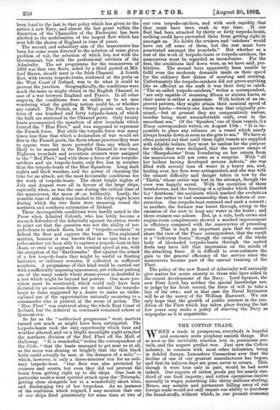THE NAVAL MANCEUVRES. T HE Naval War-Game for 1892 closes on
Monday, when the vessels transferred from the Reserve to the Active Fleet for the annual sea-training are to be handed back to the "care and maintenance" crews in the dock- yards. Public opinion, anticipating the report of the Admiralty, inclines to pronounce the whole enterprise a failure. That is partly because the conditions of the game were such as to make the result a foregone conclusion. But the manceuvres cannot be pronounced a failure merely because they failed to be interesting. Even if the result of the set programme be inconclusive, we cannot judge the effect of the whole by the effect of a part, and that not the most important part. The main object of the man- ceuvres is to mobilise as large a number of ships and men in as short a time as possible, and to give the crews practical training in the work of battle. Judged by that standard, the manceuvres of 1892 were a success. The active strength of the fleet was suddenly raised on July 21st by a force of sixty ships of war. A week later, a fleet of ninety-two vessels was on the way to the scene of action. For three weeks the crews manning this immense force have been in daily training. This, if not the most interesting, is the most solid. advantage reaped by the service. The Unionist Government have been loyal to the last to that policy which has given to the nation a new Navy, and almost the last grant within the discretion of the Chancellor of the Exchequer has been allotted to the mobilisation of the largest fleet which has ever left the shores of England in time of peace. The second, and subsidiary aim of the manceuvres has been for some years directed to the solution of some given problem of war, the selection of which lies, not with the Government, but with the professional advisers of the Admiralty. The set programme for the manceuvres of .1892 was that two fleets, aided by a third posted at Mil- ford Haven, should meet in the Irish Channel. A fourth fleet, with twenty torpedo-boats, stationed at the ports on the West Coast of Ireland, was to do what it could to prevent the junction. Geographically, the conditions were much the same as might obtain in the English Channel in case of a war between England and France. In all other respects, the conditions were so unlike as to set men wondering what the guiding notion could. be, or whether any existed. The French, as M. Weyl points out, have a force of one hundred and forty torpedo-boats, of which the bulk are stationed in the Channel ports. Only twenty boats accompanied the squadron of slow ironclads which formed the "Blue Fleet," and was supposed to represent the French force. But while the torpedo force was many times less than that which a declaration of war would set free in the French ports, the fleets whose junction they were to oppose were far more powerful than any which are likely to be massed in the English Channel in wax time. Eighteen ironclads and seventeen cruisers were assigned to the "Red Fleet," and with these a force of nine torpedo- catchers and six torpedo-boats, only five less in number than the torpedo-boats of the Blue Squadron. Long dark nights and thick weather, and. the power of choosing the time for an attack, are the most favourable conditions for the work of torpedo-boats. The short bright nights of July and August _were all in favour of the large ships, especially when, as was the case during the critical time of the manceuvres, the moon sh-.,se brilliantly. Lastly, the possible time of attack was limited to the forty-eight hours during which the two fleets were steaming round the northern and southern extremities of Ireland.
These incompatible conditions were hardly noted in the Press when Admiral Colomb, who has lately become a staunch defender of the Admiralty against its critics, wrote to point out that the question was not the ability of tor- pedo-boats to attack fleets, but of "torpedo-catchers" to defend the fleet and capture the boats. This explained matters, because it was known that in no case has a tor- pedo-catcher yet been able to capture a torpedo-boat in fair chase, or even to approach its nominal speed at sea, with the exception of the • Rattlesnake.' But against the attack of a few torpedo-boats they might be useful as floating batteries, or ordinary cruisers, if collected in sufficient numbers. A programme of this kind could be carried out with a sufficiently imposing appearance, yet without putting one of the many vessels whose steam-power is doubtful to a test which might be beyond her powers. -One more pro- vision must be mentioned, which could only have been dictated by an anxious desire not to submit the torpedo- boats to risks suggested by a desire to make an undis- ciplined use of the opportunities naturally occurring to a commander who is present at the scene of action. The "Blue Fleet" was scattered along the whole East Coast of Ireland, but the Admiral in command remained ashore at Q ueenst own.
So far as the "authorised programme" went, matters turned out much as might have been anticipated. The torpedo-boats took the only opportunity which time and weather allowed, and on a bright moonlight night attacked the northern division of the Red Fleet off the Mull of Galloway. "It is wonderful," writes the correspondent of the Globe, "that the boats managed to get near us at all, as the moon was shining so brightly that the thin black hulls could actually be seen at the distance of a mile,"— which, however, is only a three-minutes' run for an ordi- nary torpedo-boat. "Our fleet was also protected by cruisers and scouts, but even they did not prevent the boats from getting right up to the ships. One boat in particular made a most spirited attack upon the Triumph,' getting close alongside her in a wonderfully short time, and discharging two of her torpedoes. As an instance of the confusion which reigned, I may mention that one of our ships fired persistently for fume time at two of our own torpedo-catchers, and. with such rapidity that they must have been sunk in war time. If our fleet had been attacked by thirty or forty torpedo-boats, nothing could have prevented them from getting right in amongst us. No doubt the cruisers and 'catchers' would have cut off some of them, but the rest must have penetrated amongst the ironclads." But whether as a test of the work of torpedo-boats or torpedo-catchers, the manoeuvres must be regarded as inconclusive. For the first, the conditions laid down were, as we have said, pro- hibitive. The second have apparently been unable to fulfil even the moderate demands made on their speed for the ordinary fleet duties of scouting and cruising. Unfortunately the torpedo-catchers did not prove anything like so efficient as the craft it was their duty to catch. "The so-called torpedo-catchers," writes a correspondent, "are only capable of steaming fifteen or sixteen knots, so their name is rather a misnomer. With boilers of an im- proved pattern, they might attain their nominal speed of twenty knots,—twenty-one knots was that originally pro- mised,—but at present they are comparatively useless, besides being most uncomfortable craft, even in the smoothest sea." Of the Spanker,' one of these vessels, the Times correspondent writes, on August 13th: "It is im- possible to place any reliance on a vessel which nearly always breaks down as soon as she gets to sea." We have so often pointed out that until these light vessels are supplied with reliable boilers, they must be useless for the purpose for which they were designed, that the narrow escape of the 'Sharpshooter' from foundering .on her return from the manceuvres will not come as a surprise. With "all her boilers having developed serious defects," she was filled with seventy tons of water in a heavy sea, and, heeling over, her fires were extinguished, and she was with the utmost difficulty and danger taken in tow by the Thetis,' whose cutter was lost in the attempt, though the crew was happily saved. With the exception of these breakdowns, and the bursting of a. cylinder which disabled the Arethusa,' the accidents which marked the evolutices were due rather to bad seamanship than to defects of con- struction. One torpedo-boat rammed and sank a consort ; in another, the furnace was burnt through, owing to the omission of the crew to keep any water in the boiler; and three cruisers ran ashore. But, as a rule, both crews and engine-room complements showed a marked improvement in efficiency compared with the manceuvres of preceding years. That is such an important gain that we cannot share the view of the Times correspondent, that the result is a "ludicrous fiasco," though the escape of the whole body of blockaded torpedo-boats through the united fleets may have left that impression on the minds of the attacking force. It is difficult to over-estimate the gain to the general efficiency of the service since the manceuvres became part of the annual training of the Fleet.
The policy of the new Board of Admiralty will naturally give matter for acute anxiety to those who have aided in the recent development of the Navy. Lord Spencer, the new First Lord, has neither the special knowledge nor, to judge by his Irish record, the force of will to take a line of his own ; and in that case the Naval Estimates will be at the mercy of Sir William Harcourt. We can only hope that the growth of public interest in the con- dition of the Fleet which has taken place during the last few years may make a policy of starving the Navy as unpopular as it is unpatriotic.



































 Previous page
Previous page